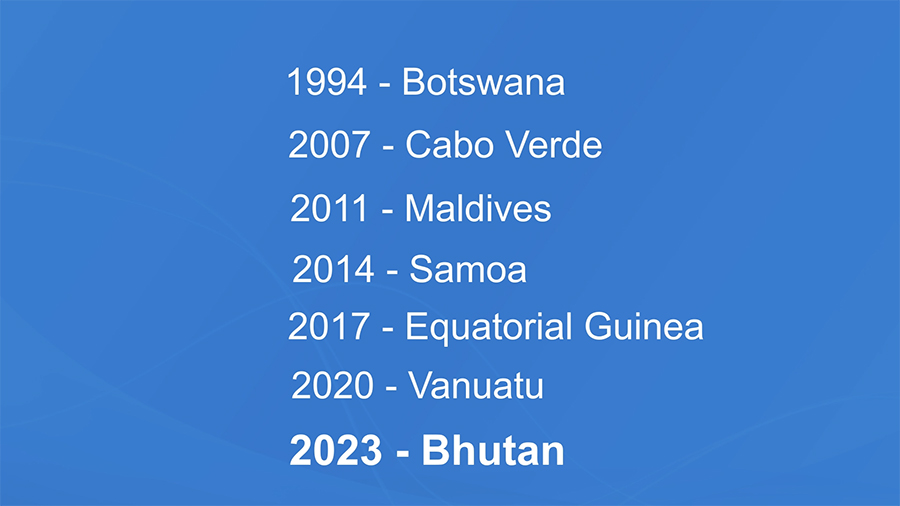
Bhutan is set to mark its official exit from the United Nations category of Least Developed Countries or LDCs tomorrow. The country will become the only seventh nation to graduate from LDCs set up by the UN in 1971. According to UN reports, Bhutan has successfully met the LDCs graduation criteria in two UN reviews of 2015 and 2018, following which Bhutan was scheduled to graduate on 13th December 2023.
According to the UN criteria, a country can graduate from the LDC status if it meets three conditions.
The criteria are based on GNI per capita, Human Assets Index, and Economic Vulnerability Index.
The UN Committee for the Development Policy or CDP conducts a review of the LDCs every three years. The countries that reach the graduation threshold levels for two of the three criteria in two consecutive reviews become eligible.
Bhutan has met all the graduation criteria.
According to UN’s CDP reports, Bhutan saw economic growth over the decade between 2010 and 2019 with more than 5 per cent average annual GDP Growth.
During this period, the number of people living on less than 3.20 US dollars per day has dropped from 36 per cent in 2007 to 12 per cent in 2017.
Bhutan has attained an average life expectancy of above 70 years, an increase of more than 17 years over the past three decades.
In terms of gross secondary school enrollment, Bhutan outperforms Bangladesh and Nepal.
The report showed that Hydro-power production, agriculture, forestry and tourism are the primary sectors contributing to economic growth.
Being an LDC, Bhutan enjoyed market access conditions and less stringent preferential rules in exporting to most developed and several developing country markets. However, after graduation, these benefits will either end or become less favourable.
Some of the economists BBS talked to say Bhutan has never been able to take advantage of the LDC position in terms of production and trade. So, the implications will be limited.
“In particular, most of Bhutan’s trade, over 80 per cent is with India and those trade, those exports and imports are governed by bilateral agreements. Similarly, as I said earlier, Bhutan is less reliant on grants. It gets more than 80 per cent from the government of India which once again does not make decisions based on LDC status. Going further to the multilateral as I said, those decisions are based on creditworthiness and income and not LDC. LDC graduation is likely to have limited downside, said Milan Thomas, an economist at the Asian Development Bank.
He added that Bhutan will have to have better policies supporting Foreign Direct Investment, FDI to attract foreign investments.
According to the FDI annual report 2022, the country saw a total of 101 FDI projects worth Nu 4.3bn as of December last year. However, the country has not been able to attract FDI projects at the pre-pandemic level.
While Bhutan graduates from LDCs tomorrow, neighbouring countries like Nepal and Bangladesh have decided to postpone their graduation.
Samten Dolkar
Edited by Sangay Chezom








